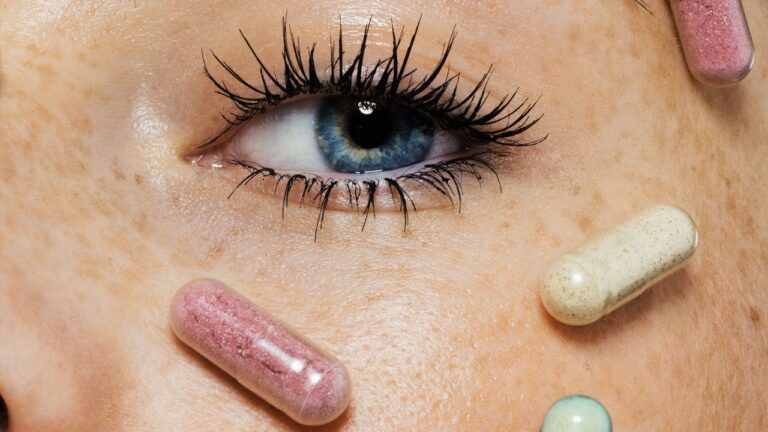
[ad_1]
Taking your vitamins used to be as simple as choosing which Flintstones character you were in the mood for. Now companies want you to down supplements with names like Heavenly Hair, Killer Nails, and Brain Dust with breakfast; Sparkle Fiber at midday; and DTF and Sleeping Beauty before bed (yes, those are all actual names of products you can buy).
It’s a lot to swallow. The supplement market is estimated to be valued at a whopping $71.37 billion by 2028. And recent surveys suggest that more than half of all Americans most likely took some form of supplement in the past 30 days.
The vitamin aisle is overflowing onto beauty shelves as more skin-care, hair-care, and wellness companies capitalize on our national obsession with an inside-out approach to overall health. Who wouldn’t want glossier hair and skin from a magic pill? In some ways, it’s part of “a movement toward ‘integrative dermatology,’ a holistic look at how our gut health, stress levels, and sleep patterns impact our overall health and the health of our skin,” says Whitney Bowe, MD, a board-certified dermatologist in New York City. She recently launched Bowe Growe, a blend of polyphenols from blueberries and concord grapes, plus lemon juice and pomegranates, designed to be added to water.
Meet the Experts:
Last year, the health and beauty supplement market for women was valued at $55.4 billion, and this year’s capsule launches are off the charts: Dr. Barbara Sturm Sun Skin, Biologique Recherche Toleskin, Murad Youth Renewal, and Perricone MD Skin & Total Body all promise to give you healthier skin. Phew, that was a mouthful (no pun intended!). Now, here come a couple more: Ouai Thick & Full, and Briogeo B. Well Vegan Omega 3, 6, 9 + Biotin want to give you bouncier, shinier hair.
But here’s the catch: Not a single one of these products is regulated by the U.S. Food & Drug Administration, and they are not intended to treat any medical condition. “Supplements are such a deep, dark box of unknowns,” says board-certified dermatologist Elizabeth K. Hale, MD, who is based in New York City. Regulations stop at the packaging; you have to list things like ingredients, but you don’t have to prove those ingredients make good on their claims.
[ad_2]